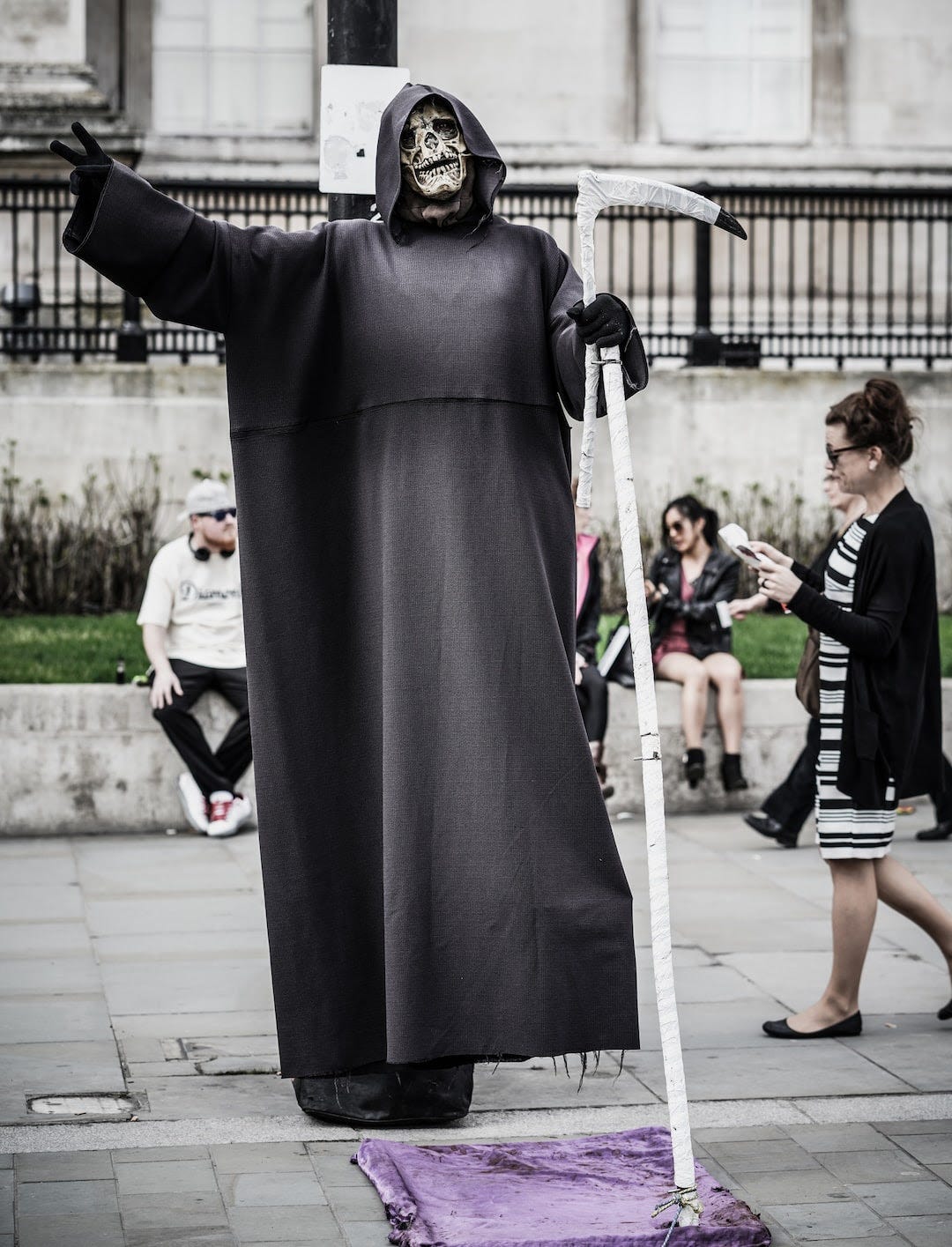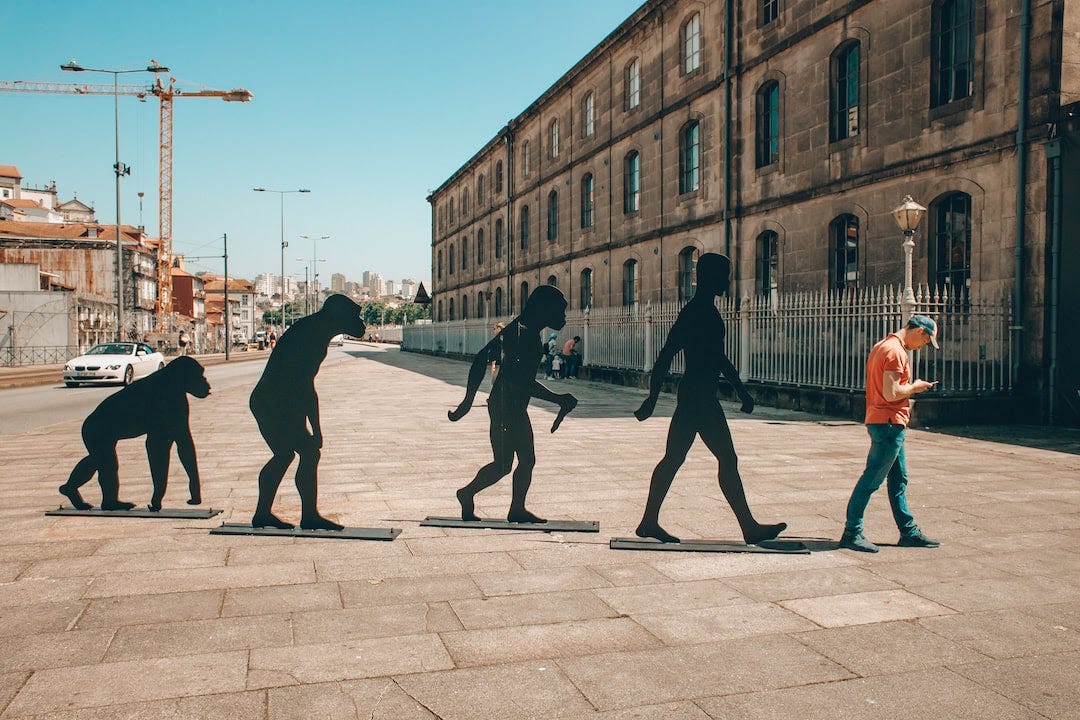Death, Fear, & Bravery
Three Point Thursday #9 | The Important Stuff
Here’s your weekly three-pointer, to open your mind.
Read the online version here
The mission of “Three Point Thursday” & about the author here
The Inevitability of Death
“Every man has two lives, and the second starts when he realizes he has just one.”—Confucius
Life is finite. No one in history has ever escaped the grim reaper!
Life is also fragile. One wrong turn on the road, a slip off a high surface, a freak disease…dead. Gone. It doesn’t take much. It can be completely accidental or random.
Don’t run away from this fact.
Perspective
People's most common words on their deathbed?
“I wish I had the courage to live a life true to myself, not the life others expected of me.”
That sounds quite depressing: realizing how great you could have been, but having no time left.
You can avoid this tragedy by meditating on your own mortality. The ancient Romans called this type of meditation Memento mori. It literally means “remember you must die.”
No one wants to die. Paradoxically however, by thinking about death, you’ll live a happier, fuller life. Because when you know this all ends, you appreciate everything more.
You feel more gratitude for every breath.
And you realize you only have so much time to do all the things you dream of.
Any moment could be your last. It’s cliché, but it’s actually the truest possible statement a human being can say.
No living thing has ever not died.
Even still, you may shrug off the whole ‘live everyday like it’s last’ thing, not only because it’s cliché, but because you think something like “Well yeah I know I’ll die at some point, but it won’t be for a while though. I’m going to live a long life, into old age.”
Nothing bad will happen to you! You’re young, healthy, and live in a safe environment! You only do things with people you trust. You’re all good.
But this is simply not accurate. The truth is, anyone of any age can die at any moment for any reason. As Jordan Peterson recently said on the Lex Fridman Podcast—the angel of death sits on every word.
Sense of Urgency
Many people don’t want to think about dying for a number of reasons, which is certainly understandable.
One of the primary reasons is that they haven’t been spending their time wisely, or not in a way they would like. In a circumstance like this, naturally someone tells themself they will start acting intelligently or doing what they want with their time—eventually.
Similar to this way of thinking is deferred happiness syndrome: the feeling that your life has not really begun, and that your present reality is simply a prelude to your magical future full of bliss.
You’ll start pursuing your dreams and really enjoy all the love in your life—eventually. Once the conditions are perfect you’ll begin. Once you get X Y or Z, then you’ll really live. Just not right now.
Both of these ways of thinking are, of course, extremely flawed. And they are the primary drivers of people looking back on their lives, full of regret, saying “What did I do with my life? Why did I settle for mediocrity? Why did I waste so much time doing things I hated doing? Why didn’t I act on my ideas?”
How to be Free
“Rehearse death. To say this is to tell a person to rehearse his freedom. A person who has learned how to die has unlearned how to be a slave.”—Seneca
What is Seneca talking about in the quote above? Unlearn how to be a slave to what you wonder?
Seneca was one of the ancient Stoics—a philosophy that author Ryan Holiday, among others, continues to spread today. (For a comprehensive introduction to Stoicism, check out this article by Gurwinder)
Another remarkable Stoic was Marcus Aurelius, the emperor of Rome from 161-180. His personal journal got put together into a book after he died, called Meditations. It’s a must read.
Anyways, what Seneca means is that, if it was going to be your last day on Earth, would you still be worrying about other people’s opinions? About pointless ‘obligations’ and soul-crushing tasks? Would you still be scared to say what you really feel?
Of course not. You would only be spending time with people you love, doing an activity you enjoy, and getting everything you want to say off your chest.
The only thing stopping you from living like this right now is fear.
But with memento mori, that fear can’t paralyze you anymore. Because you’ll know the grim reaper could tap your shoulder at any moment. You’ll know there’s no time to waste hesitating. It’s how you become bout that action boss.
The Case for Boldness
“All courses of action are risky, so prudence is not in avoiding danger (it’s impossible), but calculating risk and acting decisively. Make mistakes of ambition and not mistakesof sloth. Develop the strength to do bold things, not the strength to suffer.”—Niccolò Machiavelli
“Cowards die many times before their deaths, The valiant never taste of death but once.”—William Shakespeare
Some of the best moments of your life were probably when you did something courageously.
When you tried something new, walked right up to talk to a person you thought was cute, or said what was really on your mind.
I studied abroad in Spain this summer.
In a magical moment, I saw the beautiful Mexican artist Becky G on the beach one night.
Without hesitating, I approached her and asked her dance in Spanish.
With a twinkle in her eye she said: “fuck no, get outta here with your gringo accent.”
It stung, but at least I made a bold move.
That didn’t happen. But for real, I do remember going up a ski-lift headed to the top of a mountain in Vermont last winter, much to my dismay.
At the time, I didn’t know how to ski. Not even a little bit. I was so scared. But I knew I had to fight the intense fear I felt.
I needed scraps with the slopes.
I ended up painfully tumbling down the mountain the whole day. My body was beat up after, but it was exhilarating.
And my friends respected that a basketball player who doesn’t even know how to skate, never mind ski, had the guts to send it like that.
I would’ve regretted it if I didn’t try. If I didn’t I would’ve missed out on an exciting and hilarious experience.
This may be an extreme/ridiculous example, but you get the point.
There is much suffering to be found in not taking chances. In being timid.
Sometimes, it's actually even more risky to play it safe. It leads to you missing out on stuff. It leads to weakness. It leads to excess of comfort. It leads to your soul being crushed.
Regret is the worst feeling there is. The worst type of regret comes from things that you could’ve done, but didn’t.
It’s worth asking yourself sometimes “What is something I think is cool but am missing out on because I’m afraid to even attempt it?”
I bet you’ll find some important answers.
Roll the Dice
“It is not because things are difficult that we do not dare, it is because we do not dare that they are difficult. The Braver one is, the happier he is!”—Seneca
You may think it's foolish to be daring all the time.
Paradoxically however, being more audacious could make your life way easier.
No one goes out of their way to help the person whose doesn’t speak up for themselves. No one feels drawn to someone who isn’t confident. No one follows someone who isn’t charismatic.
People respect bravery. They respect someone who takes initiative. They respect someone who doesn’t let others opinions stop them.
By being bold, you’ll gain that respect, and have more connections and perspectives as a result.
More connections and perspectives = more opportunities.
More opportunities to do fun and engaging things = better life quality.
Basic math.
The Regret Minimization Framework
“It is not death that a man should fear, but he should fear never beginning to live.”—Marcus Aurelius
Jeff Bezos is known for, among other things, creating the “regret minimization framework.”
The idea goes: Project your mind to your 80 year old self. Imagine that version of you looking back on your life.
Without a doubt, 80 year old you would urge current you to do the most ambitious dream you have. Because 80 year old you doesn’t have the chance to anymore. And he’d kill for it.
Running this thought experiment will help you minimize the number of regrets you have (things you didn’t do, say, or try).
There’s an idea that, on the day you die, you’ll meet the best possible version of yourself. Think about being so different, so much worse, that you can’t even recognize the that version of you.
Hell.
How to Become Fearless
No one is truly fearless. But you can learn how to fear less.
How?
Through understanding why you feel so much fear in the first place, by looking at history.
Our species has been evolving for millions of years. Civilization however, is only about 10,000-15,000 years old.
On an evolutionary timescale, 10,000 years is nothing. Humans have spent way more time running around jungles naked than we have sitting in air-conditioned houses scrolling social media.
Therefore, our brains are still in-part wired for being nomadic hunter gatherers.
What emotion was critical to survive in such a way of life?
Fear. To detect predatory animals or rival tribes trying to kill you.
This tendency to produce fearful emotional responses was a reason why humans were able to survive and reproduce so much. Because we have heightened awareness of dangerous situations, and alertness during such situations.
The thing is, modern society is much safer than pre-civilizational times! There are no wild animals or groups of strangers trying to kill you every day anymore.
This not only explains our inclination to feel fear. It also exposes why many people tend to be generally negative and pessimistic.
In the distant past, there actually were wild animals and groups of strangers trying to kill you every day. So the fearful pessimist who decided to play it safe in, let’s say, exploring a new forest, ended up surviving. Meanwhile, the optimistic adventurer who ran into the woods got killed by a bear.
For generation upon generation of humans, it made more sense to be pessimistic.
But our monkey brains don’t always take into account the radical way our environment has changed. Modern society is much safer than the hunter gatherer lifestyle.
The Age of Rational Optimism
There’s no shortage of opportunities today, thanks to the internet and global transportation, among other technologies.
Now more than ever the optimistic adventurers are the ones getting rewarded. Not the fearful pessimists.
There’s more upside and less downside than ever to being a bold optimist.
It’s obviously still important to be alert in dangerous situations. And you definitely don’t want to have irrational optimism.
But the problem this evolved tendency of pessimism and negative anticipation gives people now is identifying threats that aren’t actual threats. These 21st-century “threats” are usually exaggerated or don’t even exist.
The ideas we discussed in this article: Memento Mori, knowing the importance of regret minimization, and understanding human evolution, will lead to a fulfilling life.



